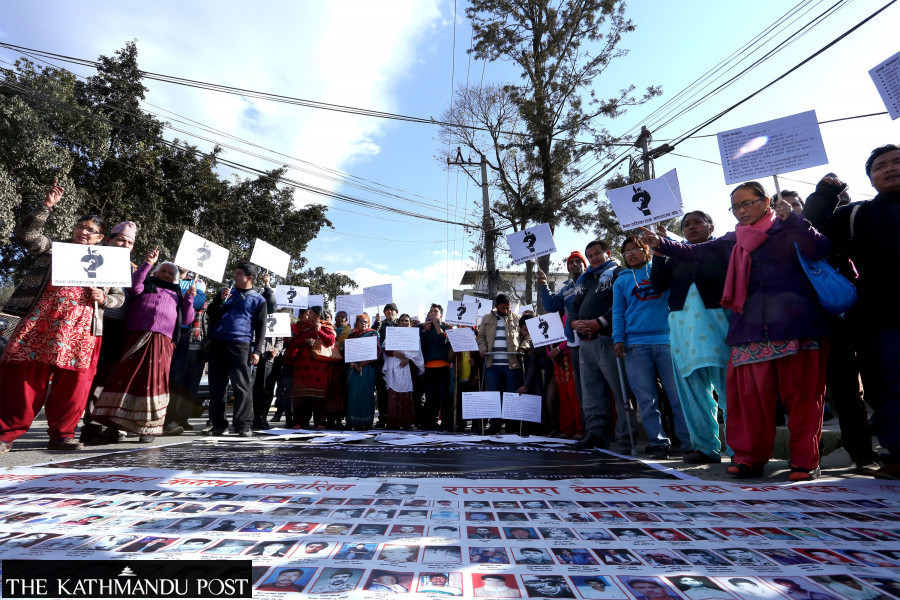National
Rights activists warn against partisan interest in transitional justice picks
Victims and rights defenders draw Sher Bahadur Deuba’s attention to Sudip Pathak’s possible nomination.
Post Report
Amid a delay in publishing a shortlist of office-bearer candidates for the two transitional justice commissions, a section of the human rights activists has expressed concern over suspected attempts to pick candidates on partisan basis.
In a statement on Wednesday, they claimed that conspiracies are being hatched against the selection of office bearers through a competitive process.
“Such unwarranted political interference in the selection process will once again put the transitional justice process at risk and undermine the national goal of completing the remaining tasks of the peace process,” reads the statement.
They are concerned as the committee formed to recommend the chairpersons and members of the Truth and Reconciliation Commission and the Commission of Investigation on Enforced Disappeared Persons struggles to publish a shortlist more than two weeks after the extended application deadline ended.
Against the claim that it would shortlist the candidates latest by November end, the Om Prakash Mishra-led committee hasn’t been able to do so. Those aware of the developments say the selection committee is waiting for the consent of the top leadership of three major parties. In particular, it awaits the return of Prime Minister KP Sharma Oli, who also is CPN-UML chairperson, from China before publishing the shortlist.
Though the committee has already met the top leaders individually, it wants Oli, Nepali Congress President Sher Bahadur Deuba and CPN (Maoist Centre) chairperson Pushpa Kamal Dahal to get their approvals on the names.
The committee had received 156 applications from retired judges, government officials, legal experts, rights defenders, and the victims of the decade-long Maoist insurgency. However, it considered only 128 names, claiming that the remaining 28 individuals were recommended by different organisations without their personal consent.
The Mishra-led panel wants to include some of the 28 names after getting their consent. Yet, these personnel being considered apparently won’t give their consent unless their appointments are assured.
In addition, the selection committee is under pressure to recommend Sudip Pathak, a former member of the National Human Rights Commission, to chair a commission. However, the victims and human rights defenders are against his nomination. This puts the committee in a fix.
Without naming Pathak, the rights defenders’ statement stresses that individuals with questionable integrity, those who courted controversies in their past constitutional responsibilities and the ones who have failed to gain legitimacy from the victims’ communities and civil society should not be recommended for transitional justice commissions. It would be unacceptable for such persons to be included in the selection process, as it would make the entire process contentious, reads the statement.
“Pathak has a controversial image as a member of the human rights commission. The statement is targeted at him,” one of the signatories to the statement told the Post.
A group of victims and human rights defenders on Wednesday met Deuba to draw his attention against Pathak’s nomination. In response, Deuba said he has already given his word to Pathak but was still ready to reconsider if there are better alternatives, according to a member of the group who spoke to the Congress leader.
On Tuesday, victims’ representatives, along with some human rights activists, met United Nations Resident Coordinator Hanaa Singer-Hamdy to discuss the UN’s role in the overall transitional justice process. “We also discussed the impartiality in the selection of the office bearers,” Gopal Shah, chairperson of the Conflict Victims National Network, told the Post.
The statement undersigned by Sushil Pyakurel, Subodh Pyakurel, Kanak Mani Dixit, Kundan Aryal, Charan Prasai, Mandira Sharma, Rajan Kuikel, Raju Prasad Chapagain and Suman Adhikari says the credibility and success of the entire transitional justice process depends on the selection of officials who have the capacity to fulfill the huge responsibility of transitional justice.
“We, therefore, strongly urge the recommendation committee to carry out the selection process independently, impartially, and transparently without any compromise,” reads the statement. “We want to warn the recommendation committee that failure to carry out their duties properly would be a betrayal to the nation.”
The selection committee, however, says it wants to recommend the best candidates for the 10 positions—five members each, including the chair, in the two commissions—and it was taking time.
“Checking the backgrounds, qualifications and expertise of so many candidates takes time. We plan to publish a shortlist by the end of this week,” Khamma Khati, spokesperson for the committee, told the Post. “We will recommend the best persons to lead the commissions through a fair and impartial process.”




 18.12°C Kathmandu
18.12°C Kathmandu













